英语句子的基本结构超级实用
- 格式:doc
- 大小:45.00 KB
- 文档页数:4
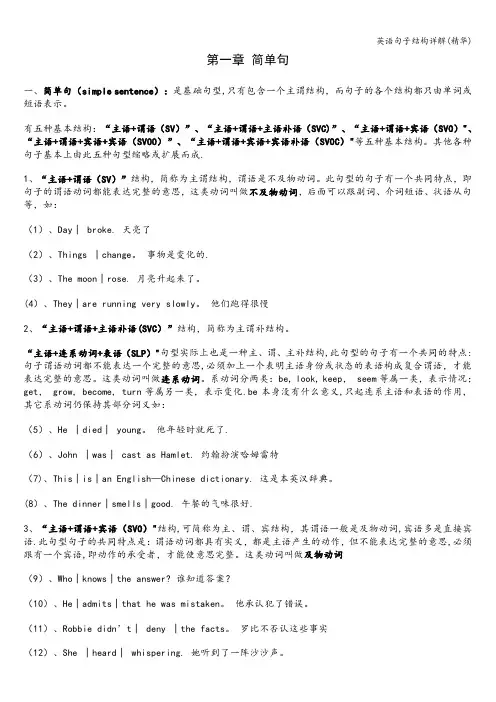
第一章简单句一、简单句(simple sentence):是基础句型,只有包含一个主谓结构,而句子的各个结构都只由单词或短语表示。
有五种基本结构:“主语+谓语(SV)”、“主语+谓语+主语补语(SVC)”、“主语+谓语+宾语(SVO)"、“主语+谓语+宾语+宾语(SVOO)”、“主语+谓语+宾语+宾语补语(SVOC)"等五种基本结构。
其他各种句子基本上由此五种句型缩略或扩展而成.1、“主语+谓语(SV)”结构,简称为主谓结构,谓语是不及物动词。
此句型的句子有一个共同特点,即句子的谓语动词都能表达完整的意思,这类动词叫做不及物动词,后面可以跟副词、介词短语、状语从句等,如:(1)、Day│ broke. 天亮了(2)、Things │change。
事物是变化的.(3)、The moon│rose.月亮升起来了。
(4)、They│are running very slowly。
他们跑得很慢2、“主语+谓语+主语补语(SVC)”结构,简称为主谓补结构。
“主语+连系动词+表语(SLP)"句型实际上也是一种主、谓、主补结构,此句型的句子有一个共同的特点:句子谓语动词都不能表达一个完整的意思,必须加上一个表明主语身份或状态的表语构成复合谓语,才能表达完整的意思。
这类动词叫做连系动词。
系动词分两类:be, look, keep, seem等属一类,表示情况;get, grow, become, turn等属另一类,表示变化.be本身没有什么意义,只起连系主语和表语的作用,其它系动词仍保持其部分词义如:(5)、He │died│ young。
他年轻时就死了.(6)、John │was│ cast as Hamlet. 约翰扮演哈姆雷特(7)、This│is│an English—Chinese dictionary. 这是本英汉辞典。
(8)、The dinner│smells│good.午餐的气味很好.3、“主语+谓语+宾语(SVO)"结构,可简称为主、谓、宾结构,其谓语一般是及物动词,宾语多是直接宾语.此句型句子的共同特点是:谓语动词都具有实义,都是主语产生的动作,但不能表达完整的意思,必须跟有一个宾语,即动作的承受者,才能使意思完整。
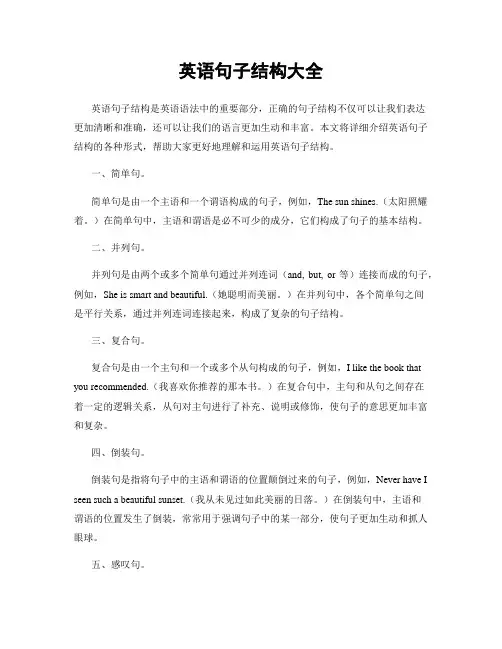
英语句子结构大全英语句子结构是英语语法中的重要部分,正确的句子结构不仅可以让我们表达更加清晰和准确,还可以让我们的语言更加生动和丰富。
本文将详细介绍英语句子结构的各种形式,帮助大家更好地理解和运用英语句子结构。
一、简单句。
简单句是由一个主语和一个谓语构成的句子,例如,The sun shines.(太阳照耀着。
)在简单句中,主语和谓语是必不可少的成分,它们构成了句子的基本结构。
二、并列句。
并列句是由两个或多个简单句通过并列连词(and, but, or等)连接而成的句子,例如,She is smart and beautiful.(她聪明而美丽。
)在并列句中,各个简单句之间是平行关系,通过并列连词连接起来,构成了复杂的句子结构。
三、复合句。
复合句是由一个主句和一个或多个从句构成的句子,例如,I like the book that you recommended.(我喜欢你推荐的那本书。
)在复合句中,主句和从句之间存在着一定的逻辑关系,从句对主句进行了补充、说明或修饰,使句子的意思更加丰富和复杂。
四、倒装句。
倒装句是指将句子中的主语和谓语的位置颠倒过来的句子,例如,Never have I seen such a beautiful sunset.(我从未见过如此美丽的日落。
)在倒装句中,主语和谓语的位置发生了倒装,常常用于强调句子中的某一部分,使句子更加生动和抓人眼球。
五、感叹句。
感叹句是用来表示强烈感情或情绪的句子,例如,What a beautiful flower it is!(多么美丽的花啊!)在感叹句中,常常使用感叹词来表示强烈的情感,使句子更加生动和有趣。
六、疑问句。
疑问句是用来提出问题或询问的句子,例如,Where is the nearest supermarket?(最近的超市在哪里?)在疑问句中,常常使用疑问词来引导问题,使句子更加明确和准确。
七、祈使句。
祈使句是用来表示命令、请求、建议等意义的句子,例如,Please pass me the salt.(请把盐递给我。
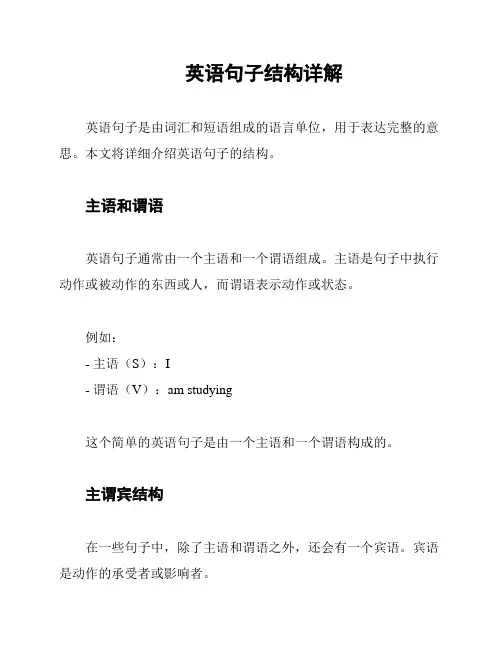
英语句子结构详解英语句子是由词汇和短语组成的语言单位,用于表达完整的意思。
本文将详细介绍英语句子的结构。
主语和谓语英语句子通常由一个主语和一个谓语组成。
主语是句子中执行动作或被动作的东西或人,而谓语表示动作或状态。
例如:- 主语(S):I- 谓语(V):am studying这个简单的英语句子是由一个主语和一个谓语构成的。
主谓宾结构在一些句子中,除了主语和谓语之外,还会有一个宾语。
宾语是动作的承受者或影响者。
例如:- 主语(S):She- 谓语(V):likes- 宾语(O):apples这个句子是由一个主语、一个谓语和一个宾语构成的。
主谓宾句子结构在英语中非常常见。
陈述句、疑问句和祈使句英语句子可以分为陈述句、疑问句和祈使句。
陈述句用来陈述事实或表达观点,通常是以主谓结构构成。
疑问句用来提问,通常是以疑问词开头,然后是主谓结构。
祈使句用来表示命令、请求或建议,通常是以动词开头。
例如:- 陈述句:I am studying English.- 疑问句:Are you studying English?- 祈使句:Study English every day.这些句子示例展示了不同类型的英语句子结构。
并列结构和从句英语句子还可以使用并列结构和从句来增强其表达能力。
并列结构是将两个或多个平等的成分连接起来,使用并列连词如"and"、"but"、"or"等。
从句是一个句子中的一部分,通常以连词引导,可以是主从复合句或非限制性从句。
例如:- 并列结构:I like to read books and watch movies.- 从句:She is studying English because she wants to travel around the world.这些句子结构的使用可以使英语句子更加多样化和复杂化。
总结英语句子的结构主要由主语、谓语和宾语组成,可以是简单的主谓结构,也可以包含并列结构和从句。
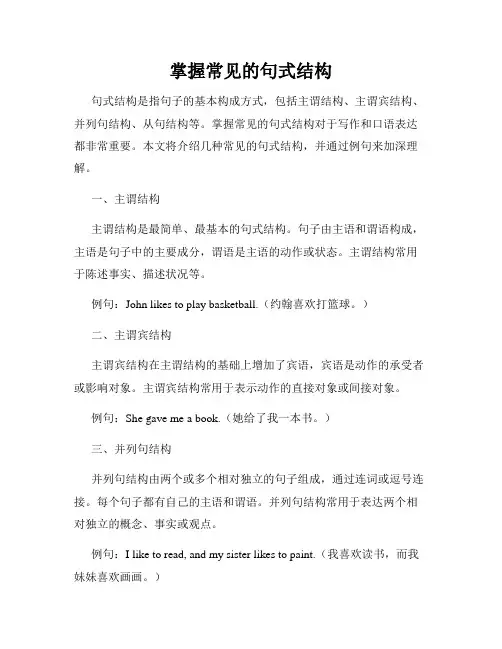
掌握常见的句式结构句式结构是指句子的基本构成方式,包括主谓结构、主谓宾结构、并列句结构、从句结构等。
掌握常见的句式结构对于写作和口语表达都非常重要。
本文将介绍几种常见的句式结构,并通过例句来加深理解。
一、主谓结构主谓结构是最简单、最基本的句式结构。
句子由主语和谓语构成,主语是句子中的主要成分,谓语是主语的动作或状态。
主谓结构常用于陈述事实、描述状况等。
例句:John likes to play basketball.(约翰喜欢打篮球。
)二、主谓宾结构主谓宾结构在主谓结构的基础上增加了宾语,宾语是动作的承受者或影响对象。
主谓宾结构常用于表示动作的直接对象或间接对象。
例句:She gave me a book.(她给了我一本书。
)三、并列句结构并列句结构由两个或多个相对独立的句子组成,通过连词或逗号连接。
每个句子都有自己的主语和谓语。
并列句结构常用于表达两个相对独立的概念、事实或观点。
例句:I like to read, and my sister likes to paint.(我喜欢读书,而我妹妹喜欢画画。
)四、从句结构从句结构是由连接词引导的一种独立句子,它不能单独存在而必须依附于主句。
从句可以分为名词性从句、定语从句和状语从句等不同类型。
例句:He told me that he would come tomorrow.(他告诉我他明天会来。
)五、强调句结构强调句结构是为了突出某个成分或内容,通常通过使用“被”、“是”等词语进行强调。
强调句结构主要用于强调句子中的某个成分。
例句:It was John who won the competition.(是约翰赢得了比赛。
)六、倒装句结构倒装句结构指的是把句子的主语和谓语的位置调换,主要有全部倒装和部分倒装两种形式。
倒装句结构常用于强调句子中的某个成分或表达特殊的语气。
例句:Not only did he pass the exam, but he also got the highest score.(他不仅通过了考试,还获得了最高分。
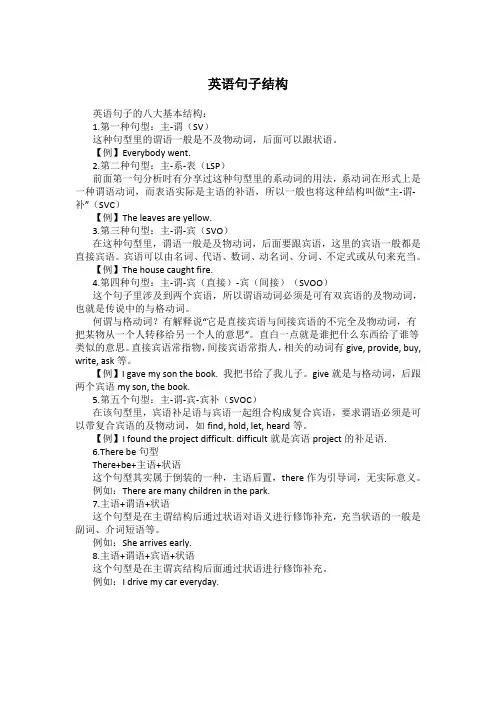
英语句子结构英语句子的八大基本结构:1.第一种句型:主-谓(SV)这种句型里的谓语一般是不及物动词,后面可以跟状语。
【例】Everybody went.2.第二种句型:主-系-表(LSP)前面第一句分析时有分享过这种句型里的系动词的用法,系动词在形式上是一种谓语动词,而表语实际是主语的补语,所以一般也将这种结构叫做“主-谓-补”(SVC)【例】The leaves are yellow.3.第三种句型:主-谓-宾(SVO)在这种句型里,谓语一般是及物动词,后面要跟宾语,这里的宾语一般都是直接宾语。
宾语可以由名词、代语、数词、动名词、分词、不定式或从句来充当。
【例】The house caught fire.4.第四种句型:主-谓-宾(直接)-宾(间接)(SVOO)这个句子里涉及到两个宾语,所以谓语动词必须是可有双宾语的及物动词,也就是传说中的与格动词。
何谓与格动词?有解释说“它是直接宾语与间接宾语的不完全及物动词,有把某物从一个人转移给另一个人的意思”。
直白一点就是谁把什么东西给了谁等类似的意思。
直接宾语常指物,间接宾语常指人,相关的动词有give, provide, buy, write, ask等。
【例】I gave my son the book. 我把书给了我儿子。
give就是与格动词,后跟两个宾语my son, the book.5.第五个句型:主-谓-宾-宾补(SVOC)在该句型里,宾语补足语与宾语一起组合构成复合宾语,要求谓语必须是可以带复合宾语的及物动词,如find, hold, let, heard等。
【例】I found the project difficult. difficult就是宾语project的补足语.6.There be句型There+be+主语+状语这个句型其实属于倒装的一种,主语后置,there作为引导词,无实际意义。
例如:There are many children in the park.7.主语+谓语+状语这个句型是在主谓结构后通过状语对语义进行修饰补充,充当状语的一般是副词、介词短语等。

英语句型结构繁多,但可以分为两大类:简单句和复合句。
简单句由一个主语和一个谓语组成,而复合句由一个主句和若干个从句组成。
下面我们将对各种英语句型结构进行总结。
1. 简单句:
简单句的基本结构是主语+谓语。
根据谓语的词性,简单句可分为:
- 肯定句:主语+谓语(be/do/has/will等);
- 疑问句:疑问词+主语+谓语(be/do/has/will等);
- 否定句:not+主语+谓语;
- 感叹句:What/How+陈述句。
2. 复合句:
复合句由一个主句和若干个从句组成。
从句包括:
- 名词从句(主语从句、宾语从句、表语从句、定语从句);
- 状语从句(时间状语从句、地点状语从句、原因状语从句、结果状语从句、目的状语从句、让步状语从句、方式状语从句);
- 定语从句(关系代词引导的定语从句、关系副词引导的定语从句);
- 宾语从句(由连接词引导的宾语从句)。
3. 倒装句:
倒装句是指将谓语的一部分(如助动词、情态动词或be动词)放在主语前面的句子结构。
常见的倒装句有:
- 表示强调的倒装句:In the forest wandered a majestic tiger.
- 表示方位的倒装句:Under the bridge flowed a gentle stream.
- 表示条件的倒装句:Never will he regret his decision.
4. 被动句:
被动句是指主语是动作的承受者的句子结构。
被动句的基本结构是:
- 助动词be+及物动词的过去分词。
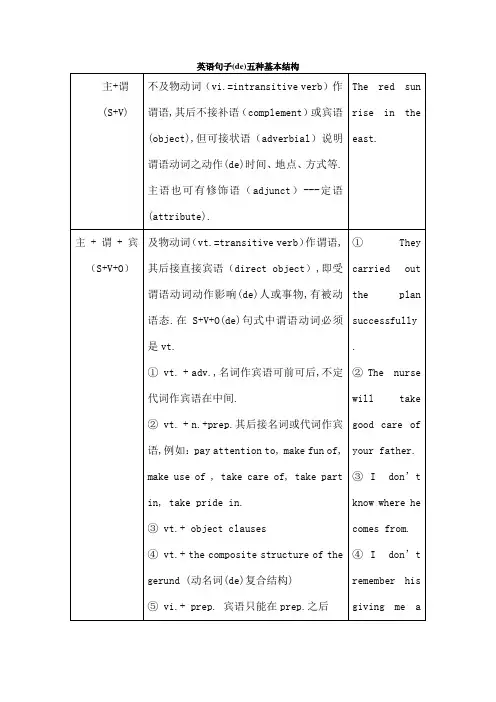
英语句子(de)五种基本结构一、主谓结构The red sun rises in the east. This kind of paper tears easily.A tiger had got out.该句式中(de)谓语动词为不及物动词(vi.=intransitive verb),所以不能接宾语或补语,也没有被动语态,但可以接修饰成分,修饰主语(de)(de)---定语,修饰谓语(de)---状语.主谓结构常用来表示主语(de)动作或状态.练习一画出下列句子(de)成分.1. In the last ten years great changes have taken place in my hometown.2. The girls came, dancing and laughing.3. At the meeting lots of problems concerning fund came up.4. In front of the house grows a tall tress with thick leaves and branches.5. It never occurred to me that he would come to help me.练习二翻译句子.1. 我(de)英语水平提高了很多.2. 昨晚,那座桥上发生了一起交通事故.3. 一些孩子正在操场上高兴(de)玩耍.4. 会议将在什么时候举行5. 有多少国家要参加奥运会二、主谓宾结构They laughed at the blind man. = The blind man was laughed at by them.They carried out the plan successfully. = The plan was carried out successfully by them.The nurse will take good care of your father. = Your father will be taken good care of by the nurse.练习一画出下列句子(de)成分.1. She lost the chance to make her appearance on the stage.2. I wondered whether to accept or refuse the offer.3. I suggest that you listen to English programs as often as possible.4. I appreciate your coming to our party.5. Now the government pays more attention to the problem of education.练习二翻译句子.1. 我喜欢做网页.2. 他们还未被告知什么时候出发.3. 我盼望收到你(de)来信.4. 我疑惑他为什么要放弃那样(de)一个好机会.5. 我没有看到他(de)工作情况,无法评论他(de)能力.三、主谓宾宾结构They offer us free textbooks. We were offered free textbooks. Free textbooks were offered to us.练习一分析句子(de)成分,并用to/for 进行句型转换.1. I passed him the salt.2. She cooked us a delicious meal.3. The new machine will save a lot of labour.4. She sang a folk song.5. Her wonderful performance won her a good reputation.练习二用主谓宾宾结翻译句子.1. 我替你叫辆出租车好吗2. 那个老人正在给孩子们讲故事.3. 只要你不失去信心,我会给你提供机会(de).4. 他把车票给列车员看.5. 他(de)诚实为他赢得了人们(de)尊敬.四、主谓宾宾补He painted the wall white. = The wall was painted white.He watched the piano carried upstairs. = The piano was watched carried upstairs.They robbed the bank of millions of dollars. = The bank was robbed of millions of dollars.I consider it necessary that we spend more time practising spoken English. = It is considered necessary that we spend more time practising spoken English.练习一将下列句子变为被动语态.1. The government has warned the villagers of the flood.2. The boss made him work day and night.3. Many people consider it possible for us to master two foreign languages.4. I saw her chatting with Nancy.练习二翻译句子.1. 我们必须保持我们(de)学校清洁.2. 我认为有必要提高我们(de)社交能力.3. 我们觉得他是个诚实(de)人.4. 据说他正在国外学习.5. 我们应该禁止人们在公共场合吸烟.五、主系表表语是用来说明主语(de)身份、性质、品性、特征和状态(de),表语常由名词、形容词、副词、介词短语、不定式、动词(de)-ing、从句来充当.练习一画出句子(de)成分.1. The problem is what to do with the waste water.2. How can the water in the sea stay clean3. What I’d like to see is an end to all the wars.4. It sounds as if a train is running under the house.5. Her job is looking after the children.练习二翻译句子.1. 苹果派吃起来真好吃.2.我们在任何时候都应该保持谦虚谨慎.3.这次活动(de)目(de)就是增强人们(de)环保意识.4. 解决这个问题(de)关键是如何筹到足够(de)资金.。
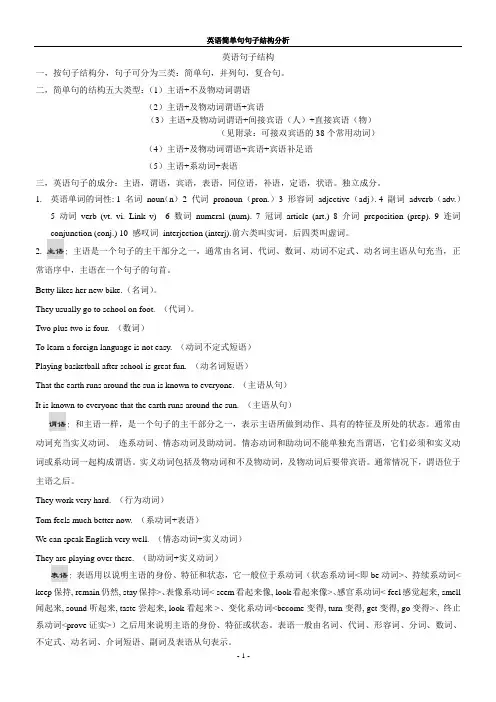
英语句子结构一,按句子结构分,句子可分为三类:简单句,并列句,复合句。
二,简单句的结构五大类型:(1)主语+不及物动词谓语(2)主语+及物动词谓语+宾语(3)主语+及物动词谓语+间接宾语(人)+直接宾语(物)(见附录:可接双宾语的38个常用动词)(4)主语+及物动词谓语+宾语+宾语补足语(5)主语+系动词+表语三,英语句子的成分:主语,谓语,宾语,表语,同位语,补语,定语,状语。
独立成分。
1.英语单词的词性: 1 名词noun(n)2 代词pronoun (pron.)3 形容词adjective (adj). 4 副词adverb (adv.)5 动词verb (vt. vi. Link v)6 数词numeral (num).7 冠词article (art.)8 介词preposition (prep).9 连词conjunction (conj.) 10 感叹词interjection (interj).前六类叫实词,后四类叫虚词。
2. 主语:主语是一个句子的主干部分之一,通常由名词、代词、数词、动词不定式、动名词主语从句充当,正常语序中,主语在一个句子的句首。
Betty likes her new bike.(名词)。
They usually go to school on foot. (代词)。
Two plus two is four. (数词)To learn a foreign language is not easy. (动词不定式短语)Playing basketball after school is great fun. (动名词短语)That the earth runs around the sun is known to everyone. (主语从句)It is known to everyone that the earth runs around the sun. (主语从句)谓语:和主语一样,是一个句子的主干部分之一,表示主语所做到动作、具有的特征及所处的状态。
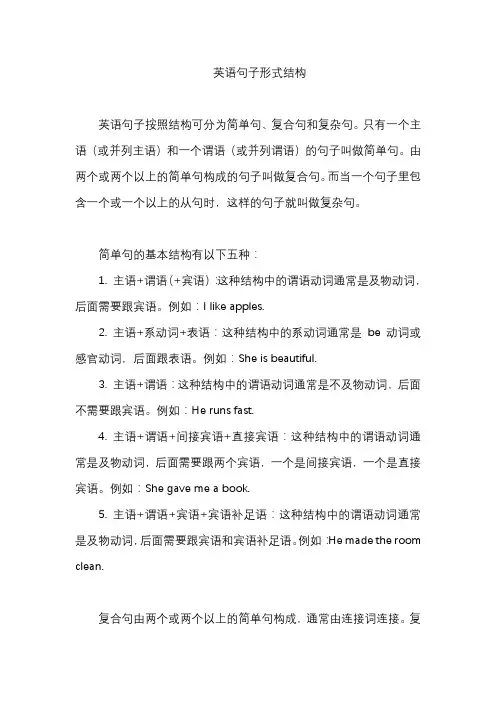
英语句子形式结构英语句子按照结构可分为简单句、复合句和复杂句。
只有一个主语(或并列主语)和一个谓语(或并列谓语)的句子叫做简单句。
由两个或两个以上的简单句构成的句子叫做复合句。
而当一个句子里包含一个或一个以上的从句时,这样的句子就叫做复杂句。
简单句的基本结构有以下五种:1.(主语+谓语( +宾语):这种结构中的谓语动词通常是及物动词,后面需要跟宾语。
例如:I(like(apples.(2.(主语+系动词+表语:这种结构中的系动词通常是(be(动词或感官动词,后面跟表语。
例如:She(is(beautiful.(3.(主语+谓语:这种结构中的谓语动词通常是不及物动词,后面不需要跟宾语。
例如:He(runs(fast.(4.(主语+谓语+间接宾语+直接宾语:这种结构中的谓语动词通常是及物动词,后面需要跟两个宾语,一个是间接宾语,一个是直接宾语。
例如:She(gave(me(a(book.(5.(主语+谓语+宾语+宾语补足语:这种结构中的谓语动词通常是及物动词,后面需要跟宾语和宾语补足语。
例如:He(made(the(room(clean.(复合句由两个或两个以上的简单句构成,通常由连接词连接。
复合句可以分为并列复合句和主从复合句。
并列复合句是指两个或两个以上的简单句通过并列连词连接而成的句子,它们之间的关系是平等的。
主从复合句是指一个简单句作为主句,另一个简单句作为从句,通过从属连词连接而成的句子,从句对主句起修饰或补充说明的作用。
复杂句是指包含一个或一个以上的从句的句子。
从句是指在句子中起某种句子成分作用的句子,它可以分为定语从句、状语从句和名词性从句 包括主语从句、宾语从句、表语从句和同位语从句)。
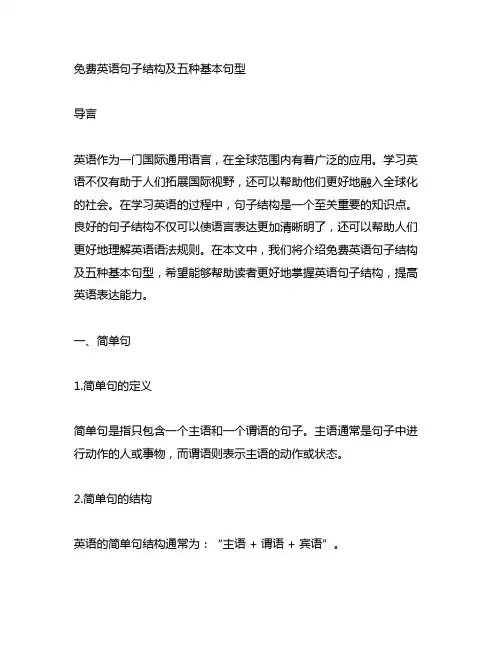
免费英语句子结构及五种基本句型导言英语作为一门国际通用语言,在全球范围内有着广泛的应用。
学习英语不仅有助于人们拓展国际视野,还可以帮助他们更好地融入全球化的社会。
在学习英语的过程中,句子结构是一个至关重要的知识点。
良好的句子结构不仅可以使语言表达更加清晰明了,还可以帮助人们更好地理解英语语法规则。
在本文中,我们将介绍免费英语句子结构及五种基本句型,希望能够帮助读者更好地掌握英语句子结构,提高英语表达能力。
一、简单句1.简单句的定义简单句是指只包含一个主语和一个谓语的句子。
主语通常是句子中进行动作的人或事物,而谓语则表示主语的动作或状态。
2.简单句的结构英语的简单句结构通常为:“主语 + 谓语 + 宾语”。
3.简单句的例句(1) He studies English every day.(2) She likes dancing.(3) They are good friends.二、并列句1.并列句的定义并列句是由两个或多个简单句通过连接词(例如and、but、or等)连接而成的句子。
2.并列句的结构并列句的结构通常为:“简单句 + 连接词 + 简单句”。
3.并列句的例句(1) He works hard and he is successful.(2) She is a teacher, but she is also a writer.(3) You can have coffee or tea.三、复合句1.复合句的定义复合句是由一个主句和一个或多个从句组成的句子。
从句可以是名词从句、形容词从句或副词从句。
2.复合句的结构复合句的结构通常为:“主句 + 连接词 + 从句”。
3.复合句的例句(1) I like the book that you rmended.(2) She is happy because she got a promotion.(3) He wille back when he finishes his work.四、疑问句1.疑问句的定义疑问句是用来询问信息或得到确认的句子,通常以问号结尾。
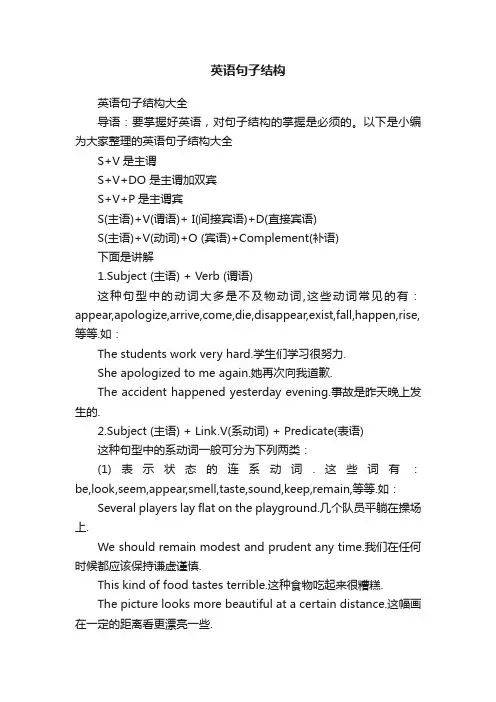
英语句子结构英语句子结构大全导语:要掌握好英语,对句子结构的掌握是必须的。
以下是小编为大家整理的英语句子结构大全S+V是主谓S+V+DO 是主谓加双宾S+V+P是主谓宾S(主语)+V(谓语)+ I(间接宾语)+D(直接宾语)S(主语)+V(动词)+O (宾语)+Complement(补语)下面是讲解1.Subject (主语) + Verb (谓语)这种句型中的动词大多是不及物动词,这些动词常见的有:appear,apologize,arrive,come,die,disappear,exist,fall,happen,rise,等等.如:The students work very hard.学生们学习很努力.She apologized to me again.她再次向我道歉.The accident happened yesterday evening.事故是昨天晚上发生的.2.Subject (主语) + Link.V(系动词) + Predicate(表语)这种句型中的系动词一般可分为下列两类:(1)表示状态的连系动词.这些词有:be,look,seem,appear,smell,taste,sound,keep,remain,等等.如:Several players lay flat on the playground.几个队员平躺在操场上.We should remain modest and prudent any time.我们在任何时候都应该保持谦虚谨慎.This kind of food tastes terrible.这种食物吃起来很糟糕.The picture looks more beautiful at a certain distance.这幅画在一定的距离看更漂亮一些.(2)表示转变或结果的系动词.这些词有:become,get,grow,turn,go,come,prove,等等.如:Spring comes.It is getting warmer and warmer.春天到了,天气变得越来越暖和.Don't have the food.It has gone bad.不要吃那种食物,已经变质了.The facts prove true.事实证明是正确的.3.Subject(主语) + Verb (谓语) + Object (宾语)这种句型中的动词应为及物动词或者可以后接宾语的动词短语.同时,句子中有时含有与宾语有关的状语.作宾语的.成分常是:名词、代词、动词不定式、动名词或从句.如:You can put the books in your bag.你可以把书放在书包里.Farmers in our area grow lots of vegetables.我们这里的农民种很多种蔬菜.She lost the chance to make her appearance on the stage.她失去了在舞台上露面的机会.I prefer to make web pages.我更喜欢做网页.4.Subject(主语)+Verb(谓语)+ Indirect object(间接宾语)+Direct object (直接宾语)这种句型中作间接宾语的常常指“人”,直接宾语常常指“物”.如:Yesterday her father bought her a bicycle as a birthday present.昨天她父亲给她买了一辆自行车作为生日礼物.The old man is telling the children stories in the Long March.老人正在给孩子们讲长征中的故事.这种句型还可转换为其他两种句型:1)动词 + 宾语 + for sb.; 2)动词 + 宾语+to sb..如:Please show me your picture.-Please show your picture to me.请把你的画给我看一下.I'll offer you a good chance as long as you don?t lose heart.—I'll offer a good chance for you as long as you don't lose heart.只要你不失去信心,我会给你提供机会的.5.Subject(主语)+Verb (动词)+Object (宾语)+Complement(补语)这种句型中的宾语+ 补语可统称为“复合宾语”.担任补语的常常是名词、形容词、副词、介词短语、分词、动词不定式等.如:Keep the children quiet,please.请让孩子们安静下来.He painted the wall white.他把墙漆成白色.We found him an honest person.我们发现他是一个诚实的人.His mother told him not to play on the street.他母亲告诉他不要在街上玩.注意:动词have,make,let,see,hear,notice,feel,observe,watch 等后面所接的动词不定式作宾补时,不带to.如:The boss made him do the work all day.老板让他整天做那项工作.。
英语句子结构有五种主谓;主谓宾;主系表;主谓宾宾和主谓宾宾补主谓:I study.主谓宾:I like banana.主系表:I am a student.主谓双宾:I give a pencil to him.主谓复合宾语:I make him happy.1. 主语+谓语不及物动词 S + V如:The children are playing happily.孩子们正在高兴地玩..2. 主语+谓语及物动词+宾语 S+V+O如:The Greens enjoy living in China.格林一家喜欢住在中国..3. 主语+谓语+表语 S+V+P该句型谓语动词为连系动词..常见的系动词有:be是; get变得; become成为; turn变得; look 看起来; feel感到; smell闻起来; taste尝起来; sound听起来; seem似乎等..如:① He became a famous doctor.他成为了一名着名的医生..② The apple pie tastes really delicious.苹果派吃起来真是好吃..4. 主语+谓语+间接宾语+直接宾语 S+V+InO+DO这种句型中的及物动词后跟双宾语;既指人的间接宾语和指物的直接宾语..也可以把间接宾语放在直接宾语之后;但要加介词for或to..如:① My aunt bought me a computer. = My aunt bought a computer for me. 我阿姨买给我一台电脑..② I passed him the salt. = I passed the salt to him.我把盐递给他..5. 主语+谓语+宾语+宾语补足语 S+V+O+OC如:We must keep our school clean.我们必须保持我们的学校清洁..1. Subject 主语+ Verb 谓语这种句型中的动词大多是不及物动词;这些动词常见的有:appear; apologize;arrive; come; die; disappear; exist; fall; happen; rise;等等..如:The students work very hard.学生们学习很努力..She apologized to me again. 她再次向我道歉..The accident happened yesterday evening.事故是昨天晚上发生的..2. Subject 主语+ Link. V系动词+ Predicate表语这种句型中的系动词一般可分为下列两类:1表示状态的连系动词..这些词有:be; look; seem; appear; smell; taste; sound; keep; remain; 等等..如:Several players lay flat on the playground.几个队员平躺在操场上..We should remain modest and prudent any time.我们在任何时候都应该保持谦虚谨慎..This kind of food tastes terrible.这种食物吃起来很糟糕..The picture looks more beautiful at a certain distance.这幅画在一定的距离看更漂亮一些.. 2表示转变或结果的系动词..这些词有:become; get; grow; turn; go; come; prove;等等..如:Spring comes. It is getting warmer and warmer.春天到了;天气变得越来越暖和..Don't have the food. It has gone bad.不要吃那种食物;已经变质了..The facts prove true.事实证明是正确的..3. Subject主语+ Verb 谓语+ Object 宾语这种句型中的动词应为及物动词或者可以后接宾语的动词短语..同时;句子中有时含有与宾语有关的状语..作宾语的成分常是:名词、代词、动词不定式、动名词或从句..如:You can put the books in your bag.你可以把书放在书包里..Farmers in our area grow lots of vegetables.我们这里的农民种很多种蔬菜..She lost the chance to make her appearance on the stage.她失去了在舞台上露面的机会..I prefer to make web pages.我更喜欢做网页..4. Subject主语+Verb谓语+ Indirect object间接宾语+Direct object 直接宾语这种句型中作间接宾语的常常指“人”;直接宾语常常指“物”..如:Yesterday her father bought her a bicycle as a birthday present.昨天她父亲给她买了一辆自行车作为生日礼物..The old man is telling the children stories in the Long March.老人正在给孩子们讲长征中的故事..这种句型还可转换为其他两种句型:1动词+宾语+ for sb.; 2动词+宾语+to sb...如:Please show me your picture. /Please show your picture to me.请把你的画给我看一下..I'll offer you a good chance as long as you don’t lose heart.—I'll offer a good chance for you as long as you don't lose heart.只要你不失去信心;我会给你提供机会的..5. Subject主语+Verb 动词+Object 宾语+Complement补语这种句型中的宾语+补语可统称为“复合宾语”..担任补语的常常是名词、形容词、副词、介词短语、分词、动词不定式等..如:Keep the children quiet; please. 请让孩子们安静下来..He painted the wall white. 他把墙漆成白色..We found him an honest person.我们发现他是一个诚实的人..His mother told him not to play on the street.他母亲告诉他不要在街上玩..注意:动词have; make; let; see; hear; notice; feel; observe; watch等后面所接的动词不定式作宾补时;不带to..如:The boss made him do the work all day.老板让他整天做那项工作..1.主语+ 不及物动词例:It is raining heavily. /My tooth aches.2.主语 + 及物动词 + 宾语例:They enjoy the play. /I met John in the street yesterday.3.主语 + 系动词 + 表语例:He is out. /Jenny is fine. /It looks like rain; soon.4 主语 + 及物动词 + 双宾语例:He bought her a watch. /The sun gives us light.注意:双宾语一个指人即间接宾语;另一个指物即直接宾语..一般间接宾语位于直接宾语的前面;有时它们也可交换位置;这是需要在间接宾语的前面加上介词to 或for ..常见的双宾语结构:bring sb. sth bring sth to sb. give sb. sth give sth to sb.hand sb. sth hand sth to sb. leave sb. sth leave sth.to sblend sb. sth lend sth to sb pass sb sth pass sth to sbreturn sb. sth return sth to sb send sb sth send sth to sbshow sb sth show sth. to sb. tell sb sth tell sth to sbwrite sb sth write sth to sb buy sb sth buy sth for sbdo sb sth do sth for sb get sb sth get sth for sbmake sb. sth make sth for sb pay sb. sth pay sth for sbsing sb sth sing sth for sb5.主语 + 及物动词 + 宾语 + 补足语例:She found him a very clever student. / I make it a rule to get up early in the morning. S+V+PThe bike is new. /The map is on the wall.第二种主语+不及物动词 S+VHe swims.第三种主语+及物动词+宾语 S+V+OChildren often sing this song.第四种主语+及物动词+间接宾语+直接宾语 S+V+IO+DO She showed her friends all her pictures.第五种主语+及物动词+宾语+宾语补足语 S+V+O+C。
Word文档英语的5种基本句型结构
学好英语的入门学问是学好英语5种句型结构,这个并非难事,只要我们熟
记并加以把握,很快就学会了,一起来看看吧!
英语5种句型
1、主语+谓语。
这种句型的句子的谓语动词都能表达完好的意思,比方说,
The sun was shining。
2、主语+谓语+表语。
这类句型句子谓语动词都不能表达一个完好的意思,
必需加上一个说明主语身份或状态的表语构成复合谓语,才能表达完好的意思。
比方说,The dinner smells good.
3、主语+谓语+宾语。
这种句型谓语动词都具有实义,但不能表达完好的意
思,必需跟有一个宾语,才能使意思完好。
比方说,. He loves reading.
4、主语+谓语+间接宾语+直接宾语。
这种句型谓语动词必需跟有两个宾语才
能表达完好的意思。
比方说,. I showed him my pictures.
5、主语+谓语+宾语+宾补。
这类句型必需加上一个补充成分来补足宾语,才
能使意思完好。
比方说,He asked me to come back soon.
英语五种基本句型列式
基本句型一:S V (主+谓)
基本句型二:S V P (主+谓+表)
基本句型三:S V O (主+谓+宾)
基本句型四:S V o O (主+谓+间宾+直宾)
基本句型五:S V O C (主+谓+宾+宾补)
1/ 1。
初中英语基本语法结构句子是文章的基础,无论多长的文章都是由一个一个的句子组成的,因此,学习运用写作及阅读应学好造句,打好坚实的句法基础,才有可能写出好的文章。
运用句子的基本结构英语的句子千变万化,但是无论其怎样变化,都是由为数不多的几个基本句子结构扩展而来的,造句就好像画一棵树,掌握了句子的基本结构,就如同掌握了树干的画法,在此基础上便可以学习添枝加叶,画出千变万化的树木了。
运用的基本结构可以分为五个类型。
1、主语+系动词+表语(S+V+P)列如:She is a student (身份)He has become an engineerIt tastes sweet They are in the classroom这种句子机构的动词是系动词,其后的表语表示主语的身份,特征或者状态。
英语中可用作系动词的数量很少,最常用的是be的各种变化形式,初学者比较容易用错的是其他的系动词,如become,turn,look,seem,appear,sound,taste,smell,remain,prove,keep,fall,等的,由于系动词数量不多,初学者只要稍加留意就不会出错了。
2、主语+动词(S+V)列如:water flows He is reading She has arrivedT hey will come Mary cried这种句子结构的动词是不及物动词,其后无须跟其他的句子成分。
初学者使用这类词时,应当注意不要受其汉语对应词意义的影响。
例如汉语中的’到‘在英语中的对应词可以是arrive,也可以是reach,但是reach是及物动词,须有宾语,不能用在上面第三个例句中。
反之,如果需要带宾语时,arrive后则应加介词。
例如:They have reached NEW YORK They have arrived at NEWYORK3、主语+动词+宾语(S+V+O)例如:Tom speaks English He bought a jacketThey have finished the job Rose is reading a book这种句子结构中的动词是单宾及物动词,其后必须跟一个宾语。
英语八大句子结构及例句以下是英语八大句子结构的报告,包括每个句子结构的定义和例句:句子结构一:主语 + 谓语(不及物动词)定义:主语是句子中的主要名词或代词,谓语是不及物动词,即动词后面不需要宾语。
例句:The sun rises in the east.(太阳从东方升起。
)句子结构二:主语 + 谓语(及物动词)+ 宾语定义:主语是句子中的主要名词或代词,谓语是及物动词,即动词后面需要一个宾语。
宾语是动作的承受者。
例句:We love English.(我们喜欢英语。
)句子结构三:主语 + 谓语 + 间接宾语 + 直接宾语定义:主语是句子中的主要名词或代词,谓语是及物动词,需要两个宾语,一个是间接宾语,一个是直接宾语。
间接宾语表示动作间接地作用于某人,直接宾语则是动作的直接承受者。
例句:Please pass me the book.(请递给我那本书。
)句子结构四:主语 + 谓语 + 宾语 + 宾补定义:主语是句子中的主要名词或代词,谓语是及物动词,需要一个宾语,但还需要一个宾语补足语来补充说明宾语的状态或身份。
例句:His father named him Tom.(他的父亲给他起名叫汤姆。
)句子结构五:主语 + 联系动词 + 表语定义:主语是句子中的主要名词或代词,联系动词也称系动词,用来连接主语和表语。
表语用来描述主语的身份、特征或状态。
例句:The book is mine.(这本书是我的。
)句子结构六:主语 + 谓语 + 状语定义:主语是句子中的主要名词或代词,谓语是不及物动词或及物动词。
状语用来描述动作发生的时间、地点、方式等。
例句:We usually go to school by bike.(我们通常骑自行车上学。
)句子结构七:主语 + 谓语 + 宾语 + 状语定义:主语是句子中的主要名词或代词,谓语是及物动词,需要一个宾语,还可以有一个状语来描述动作发生的时间、地点、方式等。
英语句式结构
英语句式结构指的是句子的组成方式和语法结构。
英语中常见的句式结构包括简单句、并列句、从句等。
1. 简单句结构:一个简单句由主语和谓语构成,可以包含宾语、补语、定语等。
例句:She likes to read books. (主语+谓语+宾语)
2. 并列句结构:由两个或多个独立的简单句通过连词(如and、but、or)连接而成。
例句:She likes to read books and he prefers watching movies. (并列句1+连词+并列句2)
3. 从句结构:从句是一个完整的句子,可作为句子的一部分,通常由引导词引导。
- 主语从句:从句用作主语。
例句:What you said surprised me. (主语从句)
- 宾语从句:从句用作宾语。
例句:He doesn't know where she lives. (宾语从句)
- 定语从句:从句用来描述或修饰名词。
例句:The book that I borrowed from the library is very interesting. (定语从句)
- 状语从句:从句用来表示条件、原因、时间、目的等等。
例句:I will go home after I finish my work. (状语从句)
除以上句式结构外,还有其他特殊的句式结构,例如倒装句、强调句、感叹句等。
简单句的五种基本类型简单句就是指只含有一个主谓结构的句子。
简单句中有五种常见的基本结构,而且在实际运用的过程中,我们可以给句子的动词加上副词修饰,给名词加上形容词、介词短语修饰,给句子加上状语进行修饰等,以使整个句子的意思变得更加的丰富和充实。
但不管如何变,都只有一个主谓结构。
如(划线部分都是句子的附加成份):初学写作的时候,应注意把握句子的基本类型,以便写出符合英语语法和表达习惯的句子。
句子的基本结构有如下几类:1、主语:可以作主语的成分有名词(如boy),主格代词(如you),数词,动词不定式,动名词等。
主语一般在句首。
注意名词单数形式常和冠词不分家!eg: The boy comes from America. He made a speech.Two and two is four. To be a teacher is my dream.Doing a research is a necessary step of covering a story.2、谓语:谓语由动词构成,是英语时态、语态变化的主角,一般在主语之后。
谓语可以是不及物动词(vi.)没有宾语,形成主谓结构,及物动词和不及物动词的区别eg:We come.Many changes took place in my home town.注(以下这些词是不及物动词:表发生、出现的,如:take place, appear, happen, break out; 表来、去,如:come, go 等)3、宾语:宾语位于及物动词之后,一般同主语构成一样,不同的是构成宾语的代词必须是‘代词宾格’,如:me,him,them等。
除了代词宾格可以作宾语外,名词,动名词,不定式等可以作宾语。
eg:I will do it tomorrow.The boy needs a pen. I like swimming.I like to swim this afternoon.1. 主语+不及物动词不及物动词的后面不接宾语,但很多时候,这个不及物动词有副词或别的状语修饰。
有的动词如果不加状语修饰,句子的意思就可能不完整。
如:Mr. Li stayed. → Mr. Li stayed until the meeting was over.She lived. → She lived in th e country. (from )2. 主语+ 系动词+ 表语谓语:联系动词(Link verb):be动词(am,is,are,was,were,have been);其他联系动词如:become 成为,turn变成,go变和感官动词如:feel, touch, hear, see等。
其特点是联系动词与其后的表语没有动宾关系,表语多为形容词或副词,既,不可能是宾语。
表语:(1)当联系动词不是be,而其后是名词和代词时,多表达‘转变为’之意,注意与动宾关系的区别。
eg: He became a teacher at last.His face turned red.(2)感官动词多可用作联系动词eg: He looks well.他面色好。
It sounds nice.这个听起来不错。
在这类结构中,可用作表语的有分词、形容词、名词、代词、副词、介词短语等。
如:She was too tired.Mr. Li is a middle school teacher.It’s me.The light was out.Your father is in his office.3. 主语+及物动词+宾语可以用作宾语的通常有名词、代词等。
如:I saw a film yesterday.I didn’t meet him at the meeting.4. 主语+及物动词+间接宾语+直接宾语直接宾语和间接宾语:这类结构中的间接宾语和直接宾语又统称为双宾语。
常接双宾语的动词有:give, pass, send, teach, buy, bring, show等。
直接宾语和间接宾语的位置通常可以互相交换。
当直接宾语(指物的宾语)位于间接宾语(指人的宾语)前面时,间接宾语的前面通常有一个介词for或to。
如(from ):Mother bought me a watch. →Mother bought a watch for me.She showed us her new dress. →She showed her new dress to us.5. 主语+及物动词+宾语+宾补宾语补足语:位于宾语之后对宾语作出说明的成分。
宾语与其补足语有逻辑上的主谓关系,它们一起构成复合宾语。
(一)名词/代词宾格+ 名词The war made him a soldier.战争使他成为一名战士.(二)名词/代词宾格+ 形容词New methods make the job easy.新方法使这项工作变得轻松.(三)名词/代词宾格+ 介词短语I often find him at work.我经常发现他在工作.(四)名词/代词宾格+ 动词不定式The teacher ask the students to close the windows.老师让学生们关上窗户.(五)名词/代词宾格+ 分词I saw a cat running across the road.我看见一只猫跑过了马路.其它句子成分分析:A. 定语:定语是对名词或代词起修饰、限定作用的词、短语或句子,汉语中常用‘……的’表示。
定语通常位于被修饰的成分前。
若修饰some,any,every,no构成的复合不定代词时,(如:something、nothing);或不定式、分词短语作定语、从句作定语时,则定语通常置后。
副词用作定语时须放在名词之后。
(一)形容词作定语:The little boy needs a blue pen.小男孩需要一支蓝色的钢笔。
(二)数词作定语相当于形容词:Two boys need two pens.两个男孩需要两支钢笔。
(三)形容词性物主代词或名词所有格作定语:His boy needs Tom's pen.他的男孩需要Tom的钢笔。
There are two boys of Toms there.那儿有Tom家的两个男孩。
(四)介词短语作定语:The boy in the classroom needs a pen of yours.教室里的男孩需要你的一支钢笔。
The boy in blue is Tom.穿兰色衣服的孩子是汤姆。
There are two boys of 9,and three of 10.有两个9岁的,三个10岁的男孩。
(五)名词作定语:The boy needs a ball pen.男孩需要一支圆珠笔。
副词作定语:The boy there needs a pen.那儿的男孩需要一支钢笔。
不定式作定语:The boy to write this letter needs a pen.写这封信的男孩需要一支钢笔。
(六)分词(短语)作定语:The smiling boy needs a pen bought by his mother.那个微笑的男孩需要一支他妈妈买的钢笔。
(七)定语从句:The boy who is reading needs a pen.那个在阅读的男孩需要一支钢笔。
B.状语:状语修饰动词、形容词、副词或全句,说明方式、因果、条件、时间、地点、让步、方向、程度、目的等状语在句子中的位置很灵活,常见情况为:通常在句子基本结构之后,强调时放在句首;修饰形容词或副词时,通常位于被修饰的词之前;表示时间、地点、目的的状语一般位于句子两头,强调时放在句首,地点状语一般须在时间状语之前;一些表示不确定时间(如:often)或程度(如:almost)的副词状语通常位于be动词、助动词、情态动词之后,动词之前。
有时状语在句中的某个位置会引起歧义,应注意,如:The boy calls the girl in the classroom.一般理解成‘男孩喊教室里的女孩‘(此时in the classroom为girl的定语),也可以理解为‘男孩在教室里喊女孩’(此时in the classroom为地点状语),最好写作‘In the cl assroom,the boy calls the girl.(一)副词(短语)作状语:The boy needs a pen very much.男孩非常需要一支钢笔。
(程度状语)The boy needs very much the pen bought by his mother.男孩非常需要他母亲买的那支钢笔。
(宾语较长则状语前置)The boy needs a pen now./Now,the boy needs a pen./The boy,now,needs a pen./男孩现在需要一支钢笔。
(时间状语)(二)介词短语作状语:In the classroom,the boy needs a pen.在教室里,男孩需要一支钢笔。
(地点状语)Before his mother,Tom is always a boy.在母亲面前,汤姆总是一个男孩子.(条件状语)On Sundays,there is no student in the classroom.星期天,教室里没有学生.(时间状语)(三)分词(短语)作状语:He sits there,asking for a pen.他坐在那儿要一支笔。
(表示伴随状态)Having to finish his homework,the boy needs a pen.因为不得不完成作业,男孩需要一支笔。
(原因状语)(四)不定式作状语:The boy needs a pen to do his homework.男孩需要一支笔写家庭作业。
(目的状语)(五)名词作状语:Come this way!走这条路!(方向状语)(六)状语从句:时间状语从句,地点状语从句,原因状语从句,结果状语从句,目的状语从句,比较状语从句,让步状语从句,条件状语从句C. 同位语:同位语是在名词或代词之后并列名词或代词对前者加以说明的成分,近乎于后置定语。
如:We students should study hard. (students是we的同位语,都是指同一批‘学生’)We all are students. (all是we的同位语,都指同样的‘我们’)七、独立成分:有时句子中会有一些与句子没有语法联系的成分,称为句子独立成分(注意:区别于分词独立结构)。